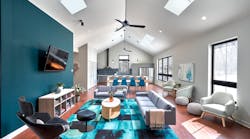Pro-bono Design Team Transforms Chicago Homeless Shelter and Changes Lives
If there have ever been doubts that design can have meaningful impact in people’s lives, projects like The Harbour in the northern suburbs of Chicago definitively put them to rest. Designed by OKW Architects—and thanks to a successful fundraising campaign from Designs for Dignity to secure in-kind donations of furniture and furnishings—a once-dilapidated homeless shelter is now a beacon of hope to women facing homelessness as a product of domestic abuse conditions.
"What started as just another building turned into the most personal project I’ve ever worked on,” Anders Rustin, senior project architect at OKW Architects, said in a written statement. “I am elated that we have reached this critical milestone. The Harbour pulls at your heartstrings because its mission is completely selfless. For these young women, it’s not just a homeless shelter. The Harbour gives them the tools to survive and thrive.”
The Harbour serves young women experiencing homelessness to provide safety, stability and personal growth including educational and employment support, basic life skills training, financial literacy and pre-natal and parenting training.
Rebuilding from the Ground Up
The client recently conducted a capitol campaign to rebuild their emergency shelter, which serves as their organization’s flagship program, providing approximately 75 young women with safe, short-term housing each year. As a nearly 100-year-old farmhouse, the current facility was structurally failing, energy inefficient and unable to meet optimal safety and programmatic needs. Rather than attempting to repair the building, the design team realized a new ground-up building would better serve the organization’s clients.
“When The Harbour realized the existing shelter was not salvageable, the organization embarked upon a campaign to make improvements to the site and design a purpose-built shelter for the young women living at the facility,” Jennifer Sobecki, CEO of Designs for Dignity (D4D). “Designs for Dignity served as a key partner in developing the look and feel of the shelter alongside OKW Architects and Kinzie Group. Our collaborative efforts created a safe space to call home for these young women. Hope has been restored at The Harbour–design truly empowers lives ,” she added.
The entire design team worked to create a large, open light-filled space. Rich, deep teal accents ground the great room and kitchen beyond. A digital lab in the great room provides a supportive learning and research space. Two bedroom and bathroom wings provide privacy and separation for younger and older residents, which serve as calm areas to rejuvenate. On-site offices for caseworkers and a private therapy room help meet client needs efficiently and give them stability in a timelier fashion.
“When a client walks in, they know that they are valued and that they can heal and gain newfound strength and empowerment in the space,” said Ed Hanlon, project manager at D4D.
Design Solutions to Furnishing Challenges
One challenge that the design team faced centered on the request for platform beds in the resident rooms. The staff wanted “tamper-free” under-bed storage for the women, so the team had to pursue a custom millwork solution. Desk surfaces needed to have reinforced mounting brackets for long-term durability. When great room lounge furnishing re-upholstery was not cost-effective, the team pursued discounted new furnishings instead.
The architect, Anders Rustin at OKW Architects, included huge banks of windows and skylights in the great room. The open A-frame ceiling structure adds incredible volume to the public space. A dining table with seating for 10 to 12 fosters a sense of family and friendship. A long kitchen island with custom stools provides an informal area for shared conversation and tasks that foster personal growth. A large feature wall anchors the television monitor in the living area and the study area alcove at the back.
Several of the donated furniture pieces are from a healthcare vendor so they’ll serve the clients well over time, Hanlon noted. Soft, abstract artworks add a sense of calm. A colorful feature in the great room is a heart-shaped panel with donor acknowledgements on colorful acrylic discs. “This piece lets the women know that this team in the community is completely behind them as they find their footing in this stage of their life,” Hanlon said.
“The outdoor patio space was a great opportunity to expand their programming space during warm weather months. So, we were able to rally new resources for outdoor furniture, festival lights, self-watering planters and plantings,” he added.
‘It Takes a Village’
Projects like The Harbour would never have been realized without dozens of in-kind donations from generous suppliers and hundreds of pro-bono hours from the project team. In total, this project included 284 pro-bono hours from team members at a value of $35,500 in design services and $138,765 in material donations for a total project value of $174,265.
“Time, talent and treasure make our projects sing,” Sobecki said. “Our design volunteers are the heart of our mission–curating a vision for the space and pulling pieces from inventory and leveraging their relationships to the hilt make our work possible. The team takes much care and thought into how they redeploy assets in a design driven way to create spaces that allow clients to thrive.”
Hanlon added that all of D4D’s projects require a community effort to execute for the greatest overall impact value for its nonprofit partners. In this case, architect Rustin and Gail Wozniak, interior designer at SBC and D4D project lead, and their staff called upon their regular resources to contribute donated or discounted products, according to Hanlon.
“If you catch the right person at the right time and if they have an open heart and open mind, they’ll come through,” he said. “We always encourage our contacts to share the opportunity with their management team in order to pursue a higher level of commitment to the cause.”
As a result of the entire team’s tireless efforts, The Harbour House project was named a finalist for this year’s Roberta Feldman Architecture for Social Justice Award from AIA Chicago. The award was established in 2020 to honor excellence in a building design guided by the conviction that access to high quality architecture is not a privilege, it is a human right. Designs for Dignity was also awarded the Design for Humanity Award from the American Society of Interior Designers (ASID) this year for its body of work over 22 years to help its nonprofit partners in the Chicagoland area.
“Design impacts lives,” Sobecki concluded. “It takes a village to bring our projects to completion—the design industry has the capacity to come to the table to provide resources—financial, material and talent to help Designs for Dignity execute its mission of empowering lives through design. Together, we make a difference.”

